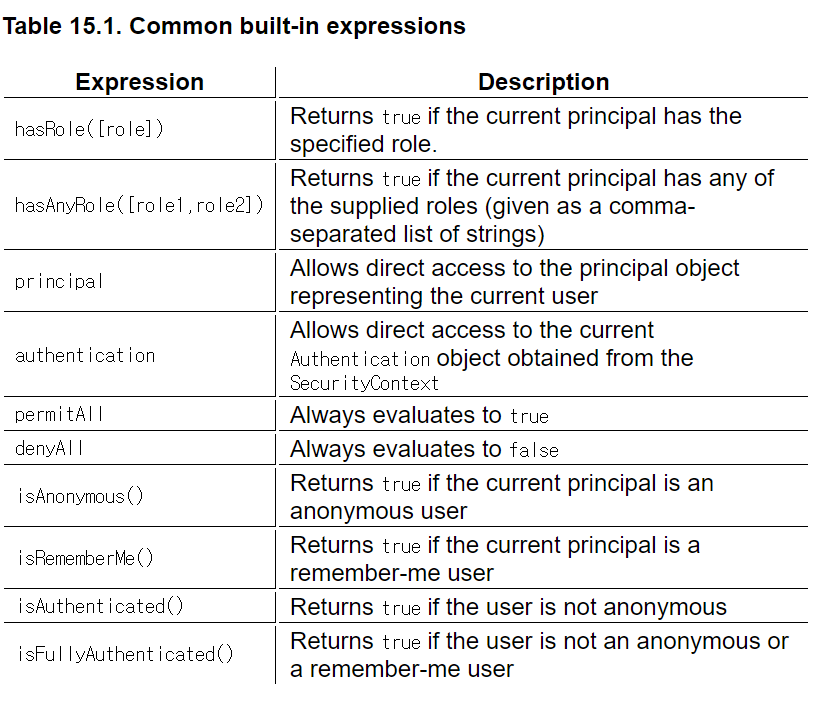-
스프링 EL?
- 객체 그래프 조작, 조작
- Unified EL과 비슷하지만 메소드 호출 기능 지원, 문자열 템플릿 기능 제공
- 자바에서 사용 가능한 EL이 있지만, SpEL은 모든 스프링 프로젝트에 걸쳐 사용할 EL
- (스프링 3.0부터 지원)
-
간단한 예제)
package me.jinmin; import org.springframework.beans.factory.annotation.Value; import org.springframework.boot.ApplicationArguments; import org.springframework.boot.ApplicationRunner; import org.springframework.stereotype.Component; @Component public class AppRunner implements ApplicationRunner { @Value("#{1 + 1}") int value; @Value("#{'hello ' + 'world'}") String greeting; @Value("#{1 eq 1}") boolean trueOrFalse; @Value("hello") String hello; @Value("${my.value}") int myValue; @Value("#{${my.value} + 1}") int myValuePlus; @Override public void run(ApplicationArguments args) throws Exception { System.out.println("==============="); System.out.println(value); System.out.println(greeting); System.out.println(trueOrFalse); System.out.println(hello); System.out.println(myValue); System.out.println(myValuePlus); } }-
결과
print: =============== 2 hello world true hello 100 101 -
표현식 :
#{}// 프로퍼티 :${} -
표현식(
#{})을 실행하고 결과값을 프로퍼티(int value;,String greeting;에 넣는다. -
표현식은 프로퍼티를 가질 수 있지만, 반대는 안 된다.
- ex)
#{${my.value} + 1}가능.
- ex)
-
빈을 참고하는 것도 가능하다.
-
\main\java\me\jinmin\Samplepackage me.jinmin; import org.springframework.stereotype.Component; @Component public class Sample { private int value = 200; } -
\main\java\me\jinmin\AppRunnerpackage me.jinmin; import org.springframework.beans.factory.annotation.Value; import org.springframework.boot.ApplicationArguments; import org.springframework.boot.ApplicationRunner; import org.springframework.stereotype.Component; @Component public class AppRunner implements ApplicationRunner { @Value("#{sample.value}") int sampleValue; @Override public void run(ApplicationArguments args) throws Exception { System.out.println("==============="); System.out.println(sampleValue); } }print: =============== 200
-
-
-
실제 사용은 어디서 할까?
-
@Value(위의 예제들) -
@ConditionalOnExpression -

-
메소드 시큐리티,
@PreAuthorize,@PostAuthorize,@PreFilter,@PostFilter-
간단 예)
@PreAuthorize("hasRole('ROLE_USER')") public void create(Contact contact); @PreAuthorize("hasPermission(#contact, 'admin')") public void deletePermission(Contact contact, Sid recipient, Permission permission); @PreAuthorize("#contact.name == authentication.name") public void doSomething(Contact contact);
-
-
-
-
@Query-
간단 예)
@Query("select u from User u where u.age = ?#{[0]}") List<User> findUsersByAge(int age); @Query("select u from User u where u.firstname = :#{#customer.firstname}") List<User> findUsersByCustomersFirstname(@Param("customer") Customer customer);
-
-
-
-
ExpressionParser의 예) (⇒ConversionService를 사용)package me.jinmin; import org.springframework.boot.ApplicationArguments; import org.springframework.boot.ApplicationRunner; import org.springframework.expression.Expression; import org.springframework.expression.ExpressionParser; import org.springframework.expression.spel.standard.SpelExpressionParser; import org.springframework.stereotype.Component; @Component public class AppRunner implements ApplicationRunner { @Override public void run(ApplicationArguments args) throws Exception { ExpressionParser parser = new SpelExpressionParser(); Expression expression = parser.parseExpression("2 + 100"); int value = expression.getValue(Integer.class); System.out.println(value); } }print: 102
